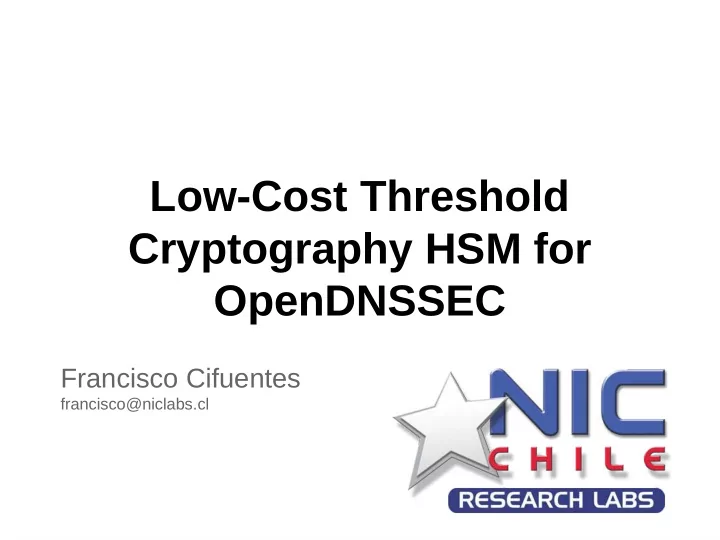

Low-Cost Threshold Cryptography HSM for OpenDNSSEC Francisco Cifuentes francisco@niclabs.cl
Problem description ● To satisfy security needs, DNS operators use Hardware Security Modules. ● Specialized hardware that have special security properties. o http://csrc.nist.gov/publications/fips/fips140-2/fips1402.pdf
Problem description ● HSM are expensive. o $50 - $50000 o FIPS 140-2 level 1 to level 4. o High security level implies high price. ● Small institutions want to deploy DNSSEC but they can not buy them.
Problem description ● What if ... – we could achieve a good security level without paying that much? – we use old and not in use hardware, and we achieve a good security level not paying at all...
Proposed solution: Low-Cost Threshold Cryptography HSM for OpenDNSSEC Francisco Cifuentes francisco@niclabs.cl
Solution description ● Threshold Cryptography N1 N2 N3 N4 N5 SD
Solution description ● Threshold Cryptography N1 N2 N3 N4 N5 SD
Solution description ● Threshold Cryptography
Solution description ● Threshold Cryptography: – Secure – Fault tolerant – Robust
Solution description ● HSM basic architecture
Solution description ● TCHSM Architecture
Solution description OpenDNSSEC Architecture
Solution description OpenDNSSEC Architecture TCHSM
Solution description
Experiments and results 2 Configuration ● Typical desktop computer ● Raspberry PI ● Intel dual-core processors at 2.8 GHz ● Broadcom BCM2835 ARM unicore at ● 4 MB of memory cache and 1 GB of 700 MHz, 128 KB of memory cache RAM ● 512 MB RAM ● (one of them used as DNS server with OpenDNSSEC) Gigabit LAN with latency lower than 1 second, 8 machines of the same type connected.
Our Raspberry PI Cluster!
Experiments and results Experiment ● 8 nodes try to sign the zone registry. ● The signature dealer waits until the first 5 not compromised nodes sign the zone registry. ● Measuring the average time of the generation of 1000 RRSIG signatures. ● Also measuring the average time of the generation of 1000 RRSIG signatures using the SoftHSM solution made by OpenDNSSEC's developers.
Experiments and results Results Key Size 1024 bits 2048 bits Project Cost SoftHSM TCHSM SoftHSM TCHSM Desktop PC 5 ms 69 ms 14 ms 283 ms $0 † Raspberry PI 21 ms 382 ms 81 ms 1408 ms $35 x 8 = $280 † We use old computers that were not in use :-)
Implementation problems ● Managed systems memory zeroization.
Future Work ● Implementation diversity. ● Full distributed threshold RSA. ● GPU Usage. ● Replication / Migration.
Distributed HSM Francisco Cifuentes - francisco@niclabs.cl Links: ● www.niclabs.cl ● github.com/niclabs/tscrypto
Recommend
More recommend